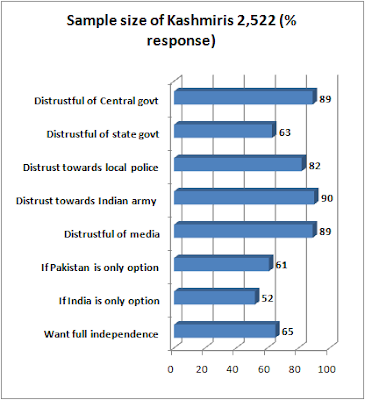Based on analysis of a sample size of 2,522 (49% female, 51% male), many of whom are interviewed face-to-face, the study says that “violent repression” by the state has caused greater identification with the “irredentist neighbour”, Pakistan. In fact, it goes a long way to underline, exposure to state violence has led to decline in “national identification” with India. Thus, if independence is not an option, “subjects preferring India over Pakistan declines by nine percentage points, from 61% to 52%.
Published in “International Organization”, a quarterly peer review academic journal, authors of the study, “Violence Exposure and Ethnic Identification: Evidence from Kashmir”, Gautam Nair and Nicholas Sambanis wonder, “If state-led repression serves to strengthen parochial and non-national identities, then why do governments turn to violence in the first place?”
They provide the following answer: “While national identification declines when study subjects are exposed to the violence treatment, they are also significantly less likely … to say they would participate in peaceful protests.” Which suggests, by using repression, the government deters “moderates from collective action, even as the seeds of future grievances are sown.”
While the education level of the sample is low (36.4% of the subjects are not formally educated), “not atypical compared to the rest of India”, the median monthly household income is between Rs 5,000 and 10,000. Those interviewed are mostly labourers, students, agriculture workers, and small business owners. About 7% work in the State government, and very few (0.4%) are with the Central government. About 93% are Muslims, 5% Shias, and just 0.2% Hindus.
According to the study, “People are distrustful of the state (63% report that they never trust the government referring to the State government; 89% report distrusting the Central government of India); and they are even more distrustful of the media (89%).” It adds, “Over 90% report distrust toward the Indian army and negative attitudes extend to the local police (82%).”
The authors insist, “These negative views seem to be supported by a widely shared perception of increasing human rights violations (64% of the sample think these have increased over the previous two years, compared to 22% who think they have decreased).” This, they add, is happening at a time when those interviewed feel that rights violations are taking place in “a climate of decreasing insurgent violence.”
The study states, “Survey subjects for the most part (55%) share the view that militancy has decreased. This suggests a shared perception of unwarranted repression by the state. About 38% of respondents claim to have personally witnessed violence by the police or army and even fewer (7%) report having been injured by violence.”
When respondents are asked to rank their religious, ethnic, national and occupational identities in order of how important they are to them, the authors say, “The national identity is ranked last”, with “the proportion of individuals who see themselves as either Indian or Indian and Kashmiri” declining “from 23% to 19%”.
Further, “While the proportion of less-educated respondents who see themselves as Indian or Indian and Kashmiri remains unchanged (19%) when these study subjects are exposed to violence, the equivalent proportion declines from 32% to 17% among those with at least a secondary school education.”
The study finds, “High-education respondents ranked their Indian identity lower after being exposed to violence and reduced the amount they donated to the NGO working all over India by one-third, reducing their allocation from 31.4% to 19.9%. Among the more educated subgroup, the proportion who believe that Kashmir should remain a part of India (rather than becoming independent or joining Pakistan) declines from 27 percent to 21 percent.”
“When faced with a binary choice of Kashmir joining Pakistan or remaining part of India, support for remaining with India falls by more than a quarter – from 59% to 43%, compared to a smaller fall (seven percentage points) among the less educated”, it adds.
Development strategies based on increasing rates of economic growth, investment will not be sufficient to end Kashmir conflict
Comment the authors, “We interpret this as consistent with a pre-existing large psychological distance from the nation because of a history of conflict and mutual suspicion. Kashmiris who do not see themselves as part of the nation will not expect to benefit from India’s economic power and are less likely to accept (or state) that India’s international status is rising.”
They add, “Our study suggests that development strategies based on increasing rates of economic growth will not be sufficient to end the conflict.” As regards “design and timing of peace-building strategies based on investments”, such investments are “unlikely to be successful unless threats to security are first addressed. Ongoing violence generates enmity and suspicion that diminish the potential of integrative policies.”
The study warns, “Reclaiming lost parts of the homeland has motivated enduring conflicts between China and Taiwan, North and South Korea, Greece and Turkey, Armenia and Azerbaijan, Serbia and Croatia, Somalia and Ethiopia, and in other cases.”
In fact, it says, “Irredentism has been a feature of major wars, including Germany’s and Hungary’s land grabs prior to and during World War II. Russia’s annexation of Crimea in 2014 was a reminder that irredentism is as important today as it is understudied.” It adds, world over, “presence of cross-border kin groups is a risk factor for civil war.”
First published on https://www.counterview.net/


